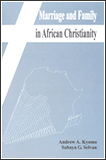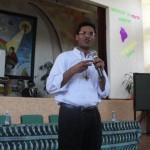Selvam, S.G. (2004). “Preparing Young People for Marriage in Africa”. In Selvam, S.G & Kyomo, K.A., Marriage and Family in African Christianity (pp.217-227) Nairobi: Acton Press. Click Link for PDF file
Reading Room
Reading Room
Marriage and Family in African Christianity
 Kyomo, A. A., & Selvam, S.G. (2004). Marriage and Family in African Christianity. Nairobi: Acton Press.
Kyomo, A. A., & Selvam, S.G. (2004). Marriage and Family in African Christianity. Nairobi: Acton Press.
Christian Families in Africa are in a phase of crisis. The crisis is about how to face change. Christian missionary activities, colonialism, westernization, urbanization, and a score of other contemporary phenomena have taken the African families to a plateau of change. The question is, will African families succumb to changes or emerge with an alternative stronger family structure?
Every crisis is a challenge and an opportunity. This one sure is. It is a challenge because the old models are not feasible in the changing social environment. The pangs of this new birth seem to bring a lot of anxiety. It is an opportunity because something more beautiful may eventually emerge. Our own reflections, discussions, assessments are very vital to contribute to the reconstruction of African Families.
The Tanzanian […]
Power is nothing without control
(A reflection shared at the Youth Vigil on the Feast of Pentecost 11-12 June 2011. This reflection was delivered from 11.30 pm to 1am. Since Powerpoint was used to illustrate the thoughts, the following notes might seem very sketchy.)
The key text that you have chosen for the Pentecost Vigil this year is:
God did not give us a spirit of timidity, but the Spirit of power and love and self-control (2Tim 1:7).
When I looked up at this theme, I remembered a billboard that I had seen years ago at Dar es Salaam, Tanzania. It was an ad for Pirelli tyres. It had the caption: “Power is nothing without control.” Therefore, I would like to reflect together with you tonight on the meaning of Power and Control.
Let me start with an analogy to clarify what I mean: just imagine that you have this beautiful car with six cylinder engine; it has a […]
Youth Caught in the Web
 Nairobi, 15 April 2011
Nairobi, 15 April 2011
A three-day symposium organised by the Institute of Youth Ministry (IYM), came to an end today at Tangaza College. On three afternoons different experts shared their ideas to a large audience on the theme of www.youthcaughtintheweb.com The symposium is an annual event, and this year’s one was specially planned by Fr Hubert Pinto. On the first day, Mr Ronald Omboto, an IT-expert, led a three hour session on the history of Internet and the World wide web (WWW). He spoke also of the tremendous possibilities that exist due to this relatively new development. He also enumerated the socio economic political and cultural impact of the internet.
On the 2nd day, Fr Sahaya G. Selvam, SDB led the discussion on three sub-themes related to ‘youth caught in the web’. He began […]
Paravar People of India
Paravar People – An Overview
Paravars are people who now inhabit most of the coastal villages from Tuticorin on the Eastern coast to Muttom on the western coast of the Indian peninsula. Their history, though very little serious research has been done, is very intriguing.
There are some claims that since Paravars are also called Bharathar, they are the original Indians who inhabited the Indus Valley before the arrival of the Aryans from central Asia. Hence they are the original Dravidians. The linguistic similarity between Bharat and Bharathar may simply be mere co-incidence.
However, the earliest mention of the Paravars in any authentic source dates back to 3rd century BC. Some archeological evidence found at Arittapatti in Melur taluk points to the fact that the Paravars were the sole fisherfolk who controlled the coast from Rameswaram down to southern cape. Probably they practiced Jainism by then. It is in that connection that the […]